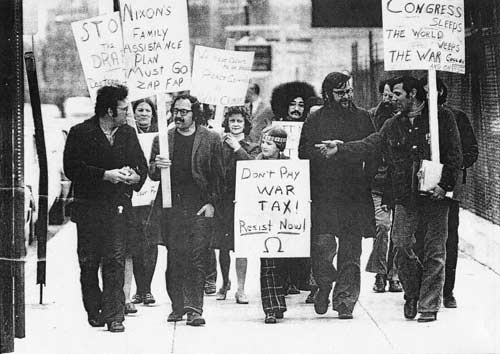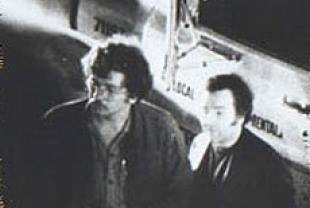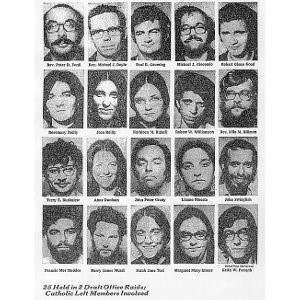Chronology of my life as the spouse of a member of the Philadelphia Resistance:
1969
- Married childhood sweetheart, that everyone loved until he tore up his draft card and sent it back to the draft board
- My parents disowned me, changing their home phone number and the locks on their doors. They told all my relatives if they had anything to do with me they would never speak to them again. Some relatives supported me, anyway.
- The Catholic Church refused to marry us or give me a letter saying that I was in good standing in the Church (which I was), because we were not “financially secure”. The real reason was that the Priest had been an Army Chaplin.
Anti-War Movement in Philadelphia, PA
- We moved into “Any Day Now”, a house named after the Joan Baez song. The house was owned by Philadelphia Quakers and was meant as a place for draft resisters and their families to live a low cost.
- The commune was very publicly known. Our telephones were tapped by the FBI. We were a very clean living commune, as we knew we were an easy target. It was a wonderfully supportive environment.
- An amusing anecdote about the wire tap was that back then you had to pay for long distance service. If we were late paying the bill the telephone would be shut off at 8 am but back on by 3, courtesy of the FBI. Moreover, knowing who was listening-in, one time one of the house mates decided to call a friend and tell them that Snow White and the Twelve Appostles were planning to break into a draft board and destroy files. For months the men in the Philadelphia Civil Disobedience Squad would approach different members of the house, saying things like “We know who the 12 apostles are as well as Snow White.”
- One time five of us borrowed a car to go see the movie “Z”. We never made it there because we were pulled over, the only reason being that the authorities did not believe we had permission to use the car! The car was illegally searched and in the trunk anti-war pamphlets were found. We were all loaded into a paddy wagon and taken to jail. After checking with the car owner, a professor at Swarthmore College, we were all let go. Our driver got a ticket because he forgot his license.
- Of course it was not fun when I went into labor at 5:30 am and the phone was dead (wire tap tape being retrieved). We had to go to a neighbor’s house to call the doctor.
- Many other adventures/misadventures…
- My husband worked for the Philadelphia Resistance. They provided information on the war and also arranged for clergy to accompany military who had gone AWOL to turn themselves in safely.

Camden 28 members Gene Dixon (far right), Milo Billman and Mike Giocondo march at a local rally in Camden. Photo courtesy of The Philadelphia Evening Bulletin
Throughout 1970 we were involved in Marches and Draft Board Actions
- A group of people would case a draft board. Break-in to take files and, with the help of others send a letter to each man telling him that if he was against the Vietnam War his draft records had been destroyed and he could not be drafted. On the other hand, if he believed in the war he could go to his draft board office and re-register.
- In the beginning of the draft board actions the “actors” would go public after the action. In time many people would claim responsibility to make it harder to be caught. One such action “We the People” was signed by many in the Philadelphia Resistance Movement. My husband was one of those who signed. I was teaching 3rd grade a few blocks from the draft board broken into. As letters went out one little boy stood up and asked me if I was related to Terry Buckalew (as my name was then Kathy C. Buckalew). He said his brother got a letter from him about his draft board. I just said “Yes, take out your math books…” ‘Never saw that coming!
December 1970 – June 1971 – A break from the Resistance while living in Wooster, Ohio
- I was pregnant and teaching 2nd grade. Terry worked as a school janitor. A little hiatus until the Media Philadelphia office of the FBI was broken into and files taken. As Terry was on top of a ladder getting a ball for one of the kids, he heard at his feet “This is FBI agent ________. Where were you on the night of March 8 [1971]?” Being in Ohio, we knew nothing of this action, and Terry so indicated. We were sharing a house with another couple and our friend, Bill, at the time of the FBI visit, was upstairs at the house studying, when he heard the door slam. Bill thought it was me coming home from school, but it was not. I never did find the personal telephone book that I had left on the table, downstairs.
July 1970 Back to Philadelphia
- Terry resumed activity with the Peace Movement. I settled in, with our daughter being due on September 29. I knew Terry was involved in come sort of peace movement activity but chose not to be informed, as I was by that point very pregnant. The morning of August 20, 1971 Terry called from jail in Camden, N.J. I asked how bad it was and he replied “Very”. Camden was in the midst of riots. It was hard to get into Camden. I got a ride and made it to the arraignment.
- It was shocking how many people I knew. After the arraignment the defendants were handcuffed, shackled and put in police cars. I reached in and kissed Terry. There were policemen with rifles pointed on the cars. I was not afraid. At least back then a white, pregnant woman was safe.
August 1971 Visiting Jail
- To communicate you had to talk on phones, with plexiglass windows in-between. I took the Lamaze Natural Child Birth Book to Terry so he could study. I was told that it was pornographic and that he could not have it!
- A decision was made, with which I agreed, that no defendant would come out on bail until all 28 of them could.
- Only four clergy took bail so they could help fund raise.
Mid-September-All defendants released on bail.
- Daughter-in-waiting, Becca, obliged by waiting until October 6 to be born.
Winter of 1972 – The Camden 28 Trial Begins
- Daycare was set up in the home of Reverend Milo Billman, who lived a block or two from the Court house.
- The trial started for 10 or 12, but not all of the 28 defendants. These defendants were the ones the prosecution felt it had the strongest case against, and, if successful the remaining defendants would go to trial later. During this time period we lived in a run-down house in Camden, with buckets to catch the water when it rained. But we were grateful to have the place to be near the court house, and with each other.
- Most of the defendants represented themselves. Attorney David Kairys provided support and direction. It was an amazing trial. Some sang political philosophical songs as their defense. Bob Goode interviewed his mother, who had already lost one son to the war. I believe the trial went from February 1973 until May.
- The crux of the defense was entrapment. When the action was in the early planning stages, a former marine, who was against the war joined the group. Bob Hardy got scared about how much trouble everyone would be in if they got caught. He naively went to the FBI so they could stop them before they broke-in to the draft board office. The FBI assured Bob that they would stop them before a crime was committed, but that obviously did not happen. J. Edgar Hoover was loaded for bear. Thus Bob became an FBI informant. Entrapment existed because whenever the group needed anything, such as food, ropes to practice climbing, flash lights, etc., the FBI obliged, giving Bob the money. Accordingly, the defense argued that but for the FBI’s assistance, the break-in could not have been committed.
- As an aside, on the night of the action I suspected something was up when Terry told me there was a nice family named Hardy, with whom I could spend the night if I didn’t want to be alone. Thank God I had decided to keep myself alone and in the dark for months—for the sake of our unborn baby, so I would continue to go it alone! Bob had backed-off from the group at the last minute so he wouldn’t be there when the FBI showed-up.
- When the verdict came in the Camden 28 were acquitted. We had a party then the trial was over and invited the jury. Those who came told us the entrapment was a big part of the acquittal, but also, that Watergate had just blown wide open. On April 30th, just a few weeks before deliberation on the Camden 28 trial, Nixon’s Chief of Staff, Domestic Affairs Advisor, and Attorney General all resigned. His Presidential Counsel was fired. One juror told us that they could not find a bunch of clergy and young people guilty of breaking and entering and destroying draft records for moral beliefs when the President and all of his men had done the same for immoral reasons.
Epilogue: Many of the 28 went on to careers in areas involving health, social services, community organizing.
Kathy



